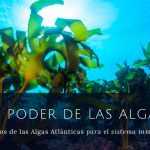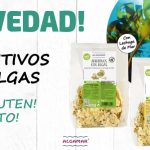Sea vegetables can have antiviral effects against Covid-19
Sea vegetables can provide effective antiviral treatments for Covid-19
Blue-green sea vegetables produce natural substances that inhibit specific infectious disease mechanisms and recent reports have described the susceptibility of the coronavirus to being inhibited by chemical compounds derived from sea vegetables.
Sea vegetables can provide antivirals to combat Covid-19, according to joint research carried out by the University of Puerto Rico (UPR) and the Wistar Institute of Philadelphia (USA).
Eduardo Caro, assistant professor in the University of Puerto Rico (UPR) Department of Pharmaceutical Sciences and project director on the island, told EFE on Tuesday that sea vegetables could offer treatment against the coronavirus.
“Sea vegetables can provide a response to this pandemic, since they have contributed to treating other diseases such as cancer,” says Caro. Research in this regard is also being carried out in Spain. Specifically, a joint project between Algas Atlánticas Algamar and Conservas Mar de Ardora and the University of Vigo is developing R&D approaches that make it possible to take advantage of the potential of sea vegetables as food and to produce “highly functional nutraceuticals”.
Blue-green sea vegetables produce natural substances that inhibit specific infectious disease mechanisms and recent reports have described the vulnerability of the coronavirus to chemical compounds derived from sea vegetables, according to Caro. “Sea vegetables can provide many solutions and this research represents an opportunity”, he emphasises.
The efforts of the Puerto Rican project are focused on discovering natural products derived from sea vegetables and other organisms from the island’s seas that can help in the development of antiviral agents for the treatment of Covid-19.
An idea that arose from lockdown
To do this, the team he leads is collaborating with the Wistar Institute in Philadelphia, which specialises in biomedical science, oncology, immunology and vaccine research.
Caro explained that during the lockdown he had the opportunity to read extensive scientific material, among which he found of particular interest research indicating that elements present in sea vegetables could act as coronavirus inhibitors.
That information led him to contact a scientist from the Wistar Institute with the idea of beginning a research project. It is now underway and has a year to present results.
The study is based on the fact that sea vegetables, specifically those from Puerto Rico, may contain coronavirus inhibitors. This means that, in the long term, drugs could be developed to combat the disease.
The tasks of the ongoing study have been divided. In Puerto Rico, the team headed by Caro is in charge of collecting the sea vegetables and carrying out the chemical analyses. For its part, the Wistar Institute is dealing with the biomolecular field and determining which components of sea vegetables may have Covid-19 inhibitors.
Years of development
“The study will eventually reach a preclinical phase”, emphasises Caro, after clarifying that the process will not be finished once it has been determined that sea vegetables contain such inhibitors. Another phase will open up involving the design of the drug, which can take years.
“The objective is to find a compound that has efficacy on infected lung cells” he indicates, after emphasising that there are many drugs derived from marine components that have been shown to be effective.
For this study, as many as 50 types of sea vegetables and other marine species have been collected that are believed to contain compounds that can act as coronavirus inhibitors.
The study may be of help to the island, where the disease is still expanding and the Health Department reported nine deaths, 233 confirmed positive cases and 225 additional probable cases this Tuesday.
Since the pandemic began, there have been 18,206 confirmed cases and 551 deaths in Puerto Rico.

